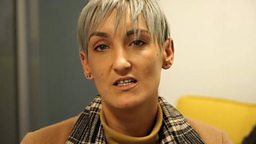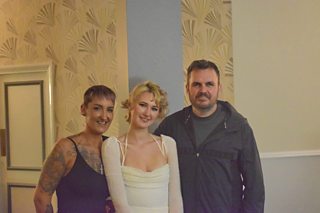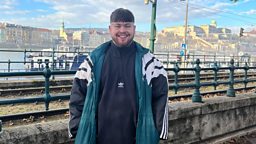Tourette’s Syndrome: ‘I didn't speak to anyone about it for 23 years'

��ѿ��ý producer Isabel Kimbrey was diagnosed with Tourette’s syndrome at the age of 7, and shared how she wanted to open up the conversation about Tourette's in "the most realistic way".
She told 5 Live Breakfast she didn't publicly speak about it for 23 years, "I just got on with my life and thought, 'Ok this is something I have to deal with'.
She went on to say, "but that's actually really isolating when you don't meet anyone who's had the same experiences as you".
Izzy explained because there’s so much stigma attached to the condition, it can be really tiring to explain to people - “it’s often seen as the swearing disease or the punchline of the joke… it’s none of those things”.
Izzy has been investigating the care provision available to diagnose and treat those with the condition.
Only 1 in 5 of the NHS Mental Health Trusts in England and Health Boards in Wales contacted by the ��ѿ��ý say they provide at least one specialist in tic disorders, including Tourette’s syndrome.
��ѿ��ý Radio 5 Live got in touch with more than 50 Trusts and Health Boards in a Freedom of Information Request. Of those that responded, 12 said they had clinicians with specialised expertise in this area.

Dr Jeremy Stern, a consultant neurologist specialising in Tourette’s syndrome and movement disorders at St George's Healthcare NHS Foundation Trust said the lack of provision is a “national problem”.
Jeremy believes Tourette’s is seen as a “niche area” by professionals, which can result in long waiting times. He says local services should take more referrals instead of rejecting them.
‘If there was one place with a specialised unit, things would be so much easier’
Claire in North Wales has twin boys, aged 9. She noticed that one of her son’s behaviours seemed slightly different; “a lot of involuntary movements, and eating was also quite difficult for him,” she said.
They went to a health visitor who referred them to paediatrics. “Every time I’d see a different community paediatrician, there was never the same person.”
He was eventually diagnosed with Tourette's in 2019 when he was six years old. Claire explained her frustration at the time “we needed a specialist, [but] there is no specialist”.
We needed a specialist, [but] there is no specialist”.
In order to seek support for her son, Claire has to travel from Wales to Alder Hey Children’s Hospital in Liverpool to see someone trained in dealing with the condition.
“I do believe if there was one place with a specialised unit, things would be so much easier.”
The Health Board in Wales responsible for providing care for Claire’s son Betsi Cadwaladr University Health Board told 5 Live
“As is the case in other NHS organisations, we need to send a small number of patients to receive care outside of our Health Board, because they have more complex needs that require care which can only be provided at specialist centres.”
‘There’s nowhere to go, and nobody seems to know where to send people either’

Another parent, Amy, from Bradford said she was forced to go private and travel to London to see a specialist to diagnose her daughter Edie. She said, “Nobody seems to know where to send people either".

I always thought everybody knows about [Tourette’s]. Therefore, surely something should be already in place, but it seems that that was not the case.”
Amy first noticed her daughter’s tics in lockdown when she started with neck twitches, which soon led to physical and verbal ticks;
“[Edie] would pull her hair and bang her head on the headboard, cupboards, anything that’s near”.
“It’s horrible to watch as a parent, she would come home from school exhausted from trying to stop [the tics] from coming out.”
Amy shared she went to her GP for help for Edie but “they didn’t know if it was neurological or whether it’s anxiety or mental health driven”.
When asked what she’d like to see change, Amy said, “I always thought everybody knows about [Tourette’s].
"Therefore, surely something should be already in place, but it seems that that was not the case.”

23-year-old Zach from Liverpool explained how the condition affects his day to day life,“ I used to have a tic in my arm, and I used to hit the inside of my car and that caused a lot of physical damage”.
Zach revealed how difficult it is to suppress; “this can cause fatigue which is then damaging me as I’m not as productive in the day, the emotional damage because I feel like I'm not accepted and then, the physical damage of these tics that could hit me or hit other things”.
‘There are no guidelines for the conditions’

Tourette's Action - a leading charity in the UK says in some areas there is currently no pathway for children or adults to be accepted into local or regional services for diagnosis and treatment.
It all boils down to the fact that there’s no NICE guidelines for the conditions.”
Chief Executive, Emma McNally, said there are often gaps in professional expertise meaning people are often referred to the wrong services and then rejected.
“Many areas have no service taking on the care of these people. As a result, there are waiting lists of over a year in a few selected clinics around the country for all age groups.
“Even if they are lucky enough to get a diagnosis, the majority of people just get diagnosed and discharged at the same appointment, being told that there isn’t anything that can be done for them.”
Tourette’s Action says the system need to be unlocked to bring relief for families, reducing the unnecessary uncertainty and suffering many are facing.
The National Institute for Health and Care Excellence says it’s not been commissioned to produce guidelines for the diagnosis and treatment of Tourette's syndrome, but it is currently assessing digitally enabled therapy for chronic tic disorders and Tourette syndrome in children and young people.
A decision is expected to be published later this year.
A Department of Health and Social Care spokesperson said:
“We are committed to supporting people living with Tourette's syndrome and other tic disorders. That is why we recognise the importance of research to better understand and find new treatments for Tourette’s syndrome and other long-term conditions.
“The majority of services for people with Tourette’s syndrome are commissioned locally by Integrated Care Boards, which are best placed to plan the provision of services subject to local prioritisation and funding.”
A Welsh Government spokesperson said:
The NHS Executive’s performance and assurance team has reviewed children’s neurodevelopmental services. Early findings show every health board in Wales provides access to diagnostic pathway for Tourette’s Syndrome.
They have also been provided with a set of recommendations on which to improve services."
